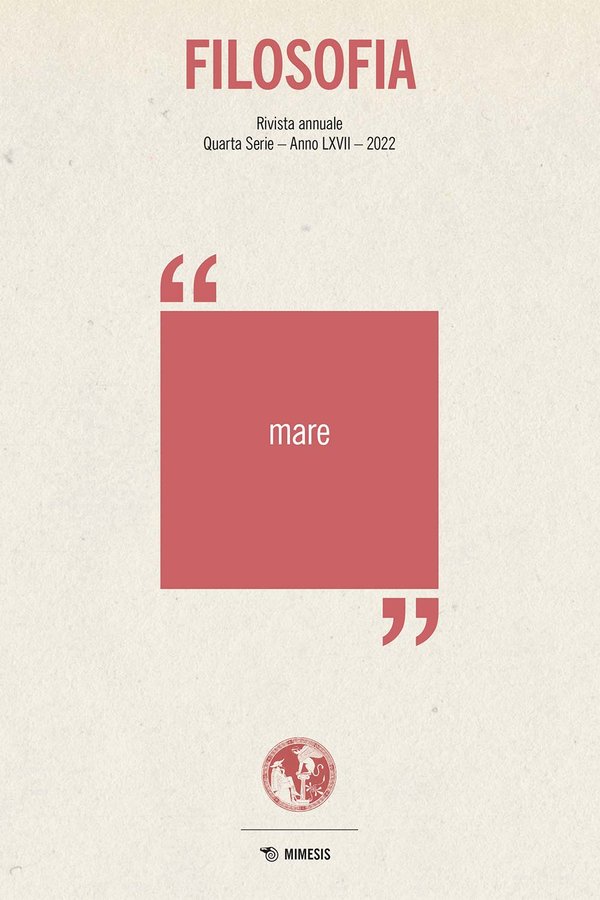Nome di Derrida
DOI:
https://doi.org/10.13135/2704-8195/7255Parole chiave:
Derrida, Torah, messianism, sovereignity, archèAbstract
Although Jackie Derrida had a deep interest in the hidden meanings of proper names, he never left us a satisfactory deconstruction of his own name. This article therefore attempts to fill this gap by examining – in a Derridean way – the name “Jackie”, whose etymology refers to the sphere of subversion. In order to achieve that, the paper takes into account two other characters from Jewish history named “Jackie” – the biblical Jacob and Jacob Frank –, who entertain an ambivalent relationship with the notion of sovereignty and embody a paradoxical coincidence of rebelliousness and obedience. The contribution then argues that – in a manner not unlike his namesakes – Derrida rejects the classical definition of power and shows the double-bind of operative de facto sovereignty and ineffectual de jure sovereignty. In conclusion, it is suggested that deconstructing the name “Jackie” helps illustrate the incompatibility of the Greek category of archè with Jewish spirituality.
Downloads
Riferimenti bibliografici
Brody, Samuel Hayim. 2018. Martin Buber’s Theopolitics. Bloomington: Indiana University Press.
Buber, Martin. 1989. La regalità di Dio. Tr. it. Michele Fiorillo. Genova-Milano: Marietti. – 2008. Storie e leggende chassidiche. Ed. it. Andreina Lavagetto. Milano: Mondadori.
Campanini, Saverio. 2014. “Da Giacobbe ai giacobini” in Le tre vite di Moses Dobrushka, Scholem Gershom, 159-231. Milano: Adelphi.
Caputo, John David. 2006. “Before Creation: Derrida’s Memory of God”. Mosaic: An Interdisciplinary Critical Journal 39, n. 3: 91-102.
Chiurazzi, Gaetano. 2019. “Derrida e l’infinito”. Giornale di Metafisica 41, n. 2: 604-619.
Cixous, Hélène. 2004. Portrait of Jacques Derrida as a Young Jewish Saint. New York: Columbia University Press.
Derrida, Jacques. 1996. Mal d’archivio. Un’impressione freudiana. Tr. it. Giovanni Scibilia. Napoli: Filema.
Derrida, Jacques. 2003. Forza di legge. Il «fondamento mistico dell’autorità». Ed. it. Francesco Garritano. Torino: Bollati Boringhieri.
Derrida, Jacques. 2009. La bestia e il sovrano, vol. I. Ed. it. Gianfranco Dalmasso. Milano: Jaca Book.
Derrida, Jacques. 2010. La bestia e il sovrano, vol. II. Ed. it. Gianfranco Dalmasso. Milano: Jaca Book.
Derrida, Jacques. 2020. La verità in pittura. Ed. it. Jacopo Vignola, Paolo Vignola. Napoli-Salerno: Orthotes.
Di Cesare, Donatella. 2019. “La teocrazia anarchica di Israele” in Teologie e politica. Genealogie e attualità, Stimilli Elettra, a cura di, 257-276. Macerata: Quodlibet.
Di Cesare, Donatella. 2020. “Anarchia”. aut aut 60, n. 388: 87-98.
Pascal, Blaise. 2000. Pensieri. Ed. it. Adriano Bausola. Milano: Bompiani.
Scholem, Gershom. 1986. Concetti fondamentali dell’ebraismo. Tr. it. Michele Bertaggia. Genova-Milano: Marietti.
Scholem, Gershom. 2014. Le tre vite di Moses Dobrushka. Tr. it. Elisabetta Zevi. Milano: Adelphi.
Scholem, Gershom. 2016a. Il nichilismo come fenomeno religioso. Tr. it. Corrado Badocco. Firenze: Giuntina.
Scholem, Gershom. 2016b. Sabbatai Sevi: The Mystical Messiah, 1626-1676. Tr. ing. Raphael Judah Zwi Werblowsky. Princeton: Princeton University Press.
Sherwood, Yvonne. 2004. “Introduction: Derrida’s Bible” in Derrida’s Bible (Reading a Page of Scripture with a Little Help from Derrida), Sherwood Yvonne, a cura di, 1-20. New York: Palgrave Macmillan.
Volli, Ugo. 2019. Il resto è interpretazione. Per una semiotica delle scritture ebraiche. Livorno: Salomone Belforte.
##submission.downloads##
Pubblicato
Come citare
Fascicolo
Sezione
Licenza
Filosofia applica una licenza Creative Commons Attribution 4.0 International License a tutto il materiale pubblicato.



